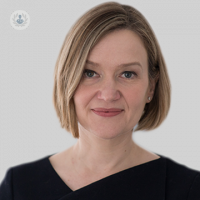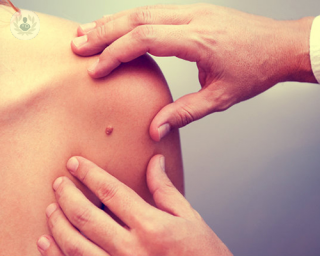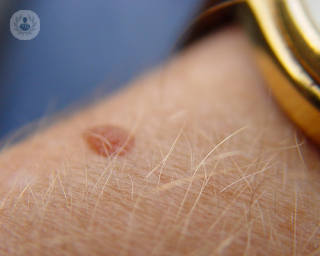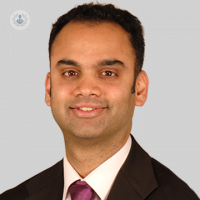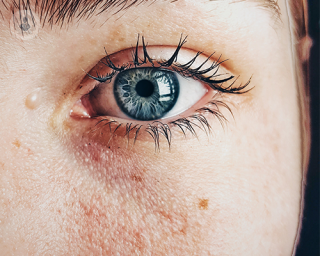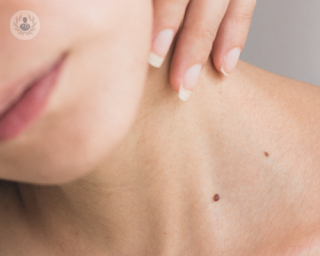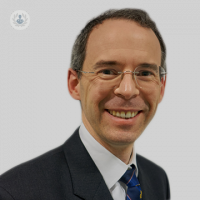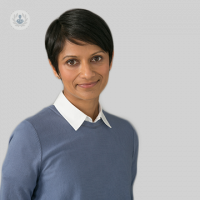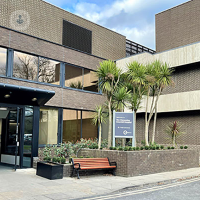Skin cancer
Miss Katherine George - Oral & maxillofacial surgery
Created on: 10-23-2015
Updated on: 08-03-2023
Edited by: Kate Forristal
What is skin cancer?
Skin cancer is one of the most commonly occuring types of cancer. There are certain types of skin cancer. There are non-melanoma skin cancers which are a group of cancers that are slow-growing and develop on the upper layers of the skin. Basal cell carcinoma (BCC) is the most common type of skin cancer and start in the cells of the lower epidermis. Squamous cell carcinoma (SCC) accounts for around 20% of skin cancers and starts in the upper layers of the epidermis.
Melanoma skin cancer is more serious and can spread to other parts of the body. If you have symtoms of skin cancer you should see a dermatologist.

What are the symptoms of skin cancer?
- smooth and pearly
- may be firm and red
- may sometimes bleed or develop a scab
- never completely heal
- itchy
- tender to the touch
- sometimes bleed
- can have a hard cap
- the skin surrounding the mole is raised
Melanomas will usually start with a change to normal skin or can develop on a mole already present.
You can use the ABCDE mole checklist to help determine if a mole has become a melanoma.
- A – Assymetrical moles
- B – Border of a mole is blurred
- C – Colour of a mole varies
- D – Diameter of the mole is irregular and larger than 7mm
- E – Evolving (melanomas will often change over time)
What causes skin cancer?
Non-melanoma skin cancers are caused by too much exposure to ultraviolet (UV) light, which comes from the sun, as well as tanning beds.
There are also a number of risk factors that can increase the chances of non-melanoma developing:
- family history of skin cancer
- pale skin that burns easily
- people with lots of moles and freckles
- medication of a medical condition that suppresses the immune system
- previous non-melanoma skin cancer
Melanoma is caused by exposure to UV light from the sun or tanning beds. Melanomas are caused by very intense exposure to UV light, such as bad sunburn on holiday.
The following risk factors increase your chances of developing melanoma:
- pale skin
- blonde or red hair
- family history of melanoma
- people with lots of moles and freckles
How can skin cancer be prevented?
It is possible to reduce your chances of developing skin cancer by reducing exposure to sunlight and avoiding sunburn. You can do this by avoiding tanning beds, covering up outdoors and wearing high SPF sunscreen. You can also avoid the sun during the hottest part of the day. It is also important to check your skin regularly and notice any changes as early diagnosis increased the chances of treatment.
What is the treatment for skin cancer?
Non-melanoma skin cancer can be treated firstly by surgically removing the cancerous tumour and surrounding skin. Non-melanoma skin cancer can also be removed to using cryotherapy (freezing). They can also be treated with radiotherapy and photodynamic therapy (PDT). Treatment option depends on the size of the skin cancer, the type and the location. Non-melanoma skin cancers are often treated successfully as the risk of the cancer spreading to other parts of the body is much lower than with melanomas.
Melanoma skin cancer is treated surgically most of the time, however, treatment depends on the circumstances of your diagnosis. Early detection and treatment can successfully treat melanoma. Advanced melanoma treatment aims to slow down the spread of the cancer and improve the symptoms. Melanoma can return once treated, so regular check-ups are essential.
